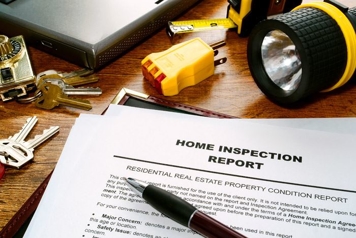 If you are in the process of selling a home, you probably will run into a professional home inspection as part of the process. For many homeowners, the pre-sale inspection is one of the most stressful parts of selling a home.
If you are in the process of selling a home, you probably will run into a professional home inspection as part of the process. For many homeowners, the pre-sale inspection is one of the most stressful parts of selling a home.
Rarely does a home inspector fail to find something wrong. The buyer wants to know everything possible that needs fixing in order to get the current owner to pay for the repairs or else lower the selling price of the home. If an inspector reports nothing wrong, the buyer may think the inspection was not thorough enough and feel like it was a waste of money to pay for the inspection. So to protect their reputations most professional home inspectors will be extremely picky when examining a home.
Or so I was told by a friend who works as a home inspector. I asked him what are some of the most common flaws he finds when he traipses through a home with a clipboard and digital camera in hand.
When it comes to plumbing, he looks hard for — and often finds– hidden water leaks. Often the homeowner isn’t even aware of them. Some occur by a toilet’s seal, which if not caught early can damage the wooden subfloor. Replacing it is an expensive project.
Other leaks can develop in piping behind a wall or in a home’s crawl space. Homes with basements sometimes experience seepage from the outside. A big concern here is when mold develops as a result. Mold remediation also is a costly problem to address.
In older homes with galvanized steel water pipes, interior scale build-up can reduce water pressure to little more than a trickle, especially when someone is trying to take a shower while a dishwasher, washing machine or other water-using appliance is in use. Re-piping can run into many thousands of dollars.
Besides being expensive, unforeseen problems add personal stress and enormously complicate the sale process. It can take weeks to hire a contractor and schedule the repairs, during which time the buyer may have second thoughts. Also, many people who sell their homes are under time pressure. You may be relocating to a new job starting soon or you may have already purchased a new home. Paying for two mortgages is a tough strain on most household budgets, especially when yours may already be tapped to pay for unexpected repairs discovered by the home inspection.
So if you are thinking about selling your home anytime soon, do yourself a favor and have one of our technicians perform a whole-house plumbing inspection. If you have a big problem, it’s better to deal with it before time pressure sets in. If you have a small problem, it’s better to deal with it before it has time to develop into a big problem.
Our Family Service Plan clients automatically receive annual inspections of their home plumbing systems. Find out more about our Family Service Plans here.
By the way, besides plumbing, here are some of the other common faults home inspectors regularly find:
- Bad electrical wiring or outlets. Sometimes this results from homeowner do-it-yourself projects where installation isn’t done in accordance with electrical codes. Sometimes rodents chew through wiring. Many older homes have two-prong outlets without the third prong for grounding. Or, the owner may have cut corners by replacing a two-prong outlet with a three-prong outlet, but without rewiring to support the three-prong outlet.
- HVAC furnace cracks or leaking ductwork. They add to heating/cooling bills and can present a threat of carbon monoxide poisoning in the home.
- Lack of adequate seismic bracing. California codes require water heaters and other appliances to be able to withstand strong earthquakes. Many older homes still lack it.
- Window issues. Broken windows are an obvious red flag. Buyers will usually want windows replaced if there are broken seals or condensation within double panes. An inspector also is likely to single out windows that are painted shut or have peeling paint.
- Construction flaws. Original construction flaws are especially common in homes built during the home construction boom that lasted from the mid-‘90s until 2008. Builders were scrambling to keep up with demand and often employed less than qualified workers. Serious defects are often deal-killers or else will require a steep reduction in your selling price.
Flawless homes may exist, but you will have a hard time finding a professional home inspector who believes that!
